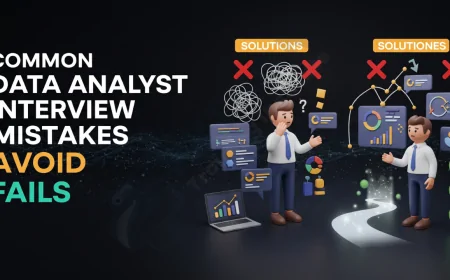Python Certification vs Python Diploma: Which One is Right for Your Career?
Wondering whether to pursue a Python certification or a diploma? Explore the key differences, career benefits, and which option is better suited for you. Learn about Python training options in Pune to kickstart your programming career.

In the world of programming and software development, Python stands out as one of the most versatile and widely used languages. From web development to machine learning, data science, and artificial intelligence, Python is a fundamental tool in the toolkit of any developer or data scientist. As Python's popularity continues to grow, many professionals and students are considering certification or diploma courses to enhance their skills and improve their career prospects. However, when it comes to professional learning, two paths stand out: Python Certification and Python Diploma.
In this article, we'll explore the key differences between Python certification and diploma courses, their benefits, and how each can impact your career. By the end of this comprehensive guide, you'll have a clearer understanding of which option is best for you.
The Growing Demand for Python Skills
Python has consistently ranked as one of the top programming languages, praised for its simplicity, versatility, and ease of use. It’s an essential language for developers, data scientists, machine learning engineers, and even business analysts. In the current tech landscape, knowing Python can open doors to various high-paying career opportunities in web development, data analysis, machine learning, AI, and more.
While Python's accessibility and popularity make it relatively easy to learn, the decision to formalize your skills with a Python course is a significant one. With so many learning options available, particularly in the realms of Python certification and Python diploma courses, it's crucial to understand the differences, advantages, and career impacts of each.
What is Python Certification?
A Python certification is typically a short-term course that provides a formal acknowledgment of your skills in Python. Certification programs are often offered by various organizations, including universities, online learning platforms, and corporate training providers. The duration of a Python certification course can range from a few weeks to a few months, depending on the intensity and depth of the curriculum.
Certification courses tend to focus on specific areas, such as Python for data science, web development, or automation. They are structured to offer practical experience and real-world applications, often with an emphasis on preparing for industry-recognized exams.
Features of Python Certification:
-
Duration: Short-term (few weeks to a few months).
-
Curriculum Focus: Often specific to certain areas such as data science, automation, or web development.
-
Recognition: Recognized by employers as proof of a certain level of expertise.
-
Mode of Learning: Available online or in-person through platforms or institutions.
-
Cost: Generally affordable, with some certifications available for free.
-
Ideal for: Beginners to intermediate learners looking to boost their skills in a specific field.
Advantages of Python Certification:
-
Quick Learning Curve: Because certification courses are short and focused, they allow learners to acquire essential Python skills in a short amount of time.
-
Industry Recognition: Python certifications are recognized by employers as proof of proficiency, making you more competitive in the job market.
-
Flexible Learning Options: Many online platforms offer self-paced certification courses, making them ideal for busy professionals or students.
-
Practical Knowledge: Certification programs typically include hands-on projects and exercises that allow you to apply your learning in real-world situations.
What is Python Diploma?
On the other hand, a Python diploma is a more comprehensive and in-depth program that provides extensive learning in Python. Diploma courses are typically longer and may range from six months to a year. They focus on offering a well-rounded understanding of Python programming and its applications, often including advanced topics like web development, database management, machine learning, and data science.
A Python diploma is a more formal qualification that provides a deeper understanding of the Python ecosystem and prepares students for a wider variety of career roles. Diploma programs are often offered by educational institutions, universities, or specialized training centers.
Features of Python Diploma:
-
Duration: Long-term (6 months to 1 year).
-
Curriculum Focus: Comprehensive coverage of Python programming, including advanced topics.
-
Recognition: Often provides a formal qualification that can be used to apply for jobs.
-
Mode of Learning: Can be available in-person or online, with in-depth curriculum.
-
Cost: More expensive than certifications, but the cost is usually justified by the comprehensive learning provided.
-
Ideal for: Individuals looking for a more thorough education in Python and those pursuing a long-term career in software development or data science.
Advantages of Python Diploma:
-
Comprehensive Learning: A Python diploma provides a deep understanding of programming concepts, data structures, algorithms, and Python’s use in various fields like machine learning, data science, and web development.
-
Career-Oriented: With the broad scope of a diploma program, graduates are well-prepared for a wide range of roles, including Python developer, data scientist, machine learning engineer, and software engineer.
-
Structured Curriculum: Diplomas offer a structured learning path with in-depth exploration of each topic, ensuring that you cover all aspects of Python programming.
-
Official Qualification: A Python diploma is a formal qualification that can be added to your resume and recognized by employers, making you more competitive in the job market.
Key Differences Between Python Certification and Diploma
1. Duration of the Course
One of the most significant differences between Python certification and diploma programs is the duration. Certification courses are typically shorter, with durations ranging from a few weeks to a few months, while diploma courses can last anywhere from six months to a year. If you're looking to quickly boost your Python skills for a specific job role, certification might be the better choice. However, if you're looking for a deeper, more comprehensive understanding, a diploma would be more suitable.
2. Depth of Knowledge
Python certification programs focus on specific areas of Python programming, such as web development, data science, or machine learning, and are ideal for learners who want to specialize in a particular field. In contrast, diploma programs offer a more holistic approach, covering a wide range of Python-related topics. They provide a deeper dive into the language and its applications, ensuring a thorough understanding of Python programming concepts.
3. Career Opportunities
While both certification and diploma programs can help you land a job, a diploma typically provides a broader skill set and is often preferred by employers seeking candidates for more advanced roles. For instance, with a Python diploma, you can apply for jobs such as Python Developer, Data Scientist, or Machine Learning Engineer. A Python certification, however, might be better suited for roles that require specialized knowledge or a quick demonstration of proficiency.
4. Cost
In general, Python certification courses tend to be more affordable than diploma programs, making them an excellent choice for individuals on a budget. However, the higher cost of a Python diploma is often justified by the more comprehensive curriculum and the formal qualification it provides.
5. Mode of Learning
Both Python certification and diploma programs offer various modes of learning, including online and in-person options. Python certification courses are typically more flexible, offering self-paced learning, while diploma programs may follow a more structured timeline and involve more in-depth coursework and assignments.
6. Employability and Recognition
While a certification can help you showcase your Python skills to potential employers, a diploma provides an official qualification that might carry more weight, especially if you’re looking for a formal role in the tech industry. A diploma also offers more comprehensive training, which can make you more adaptable to various job roles within Python programming.
Which Option is Right for You?
Choosing between a Python certification and a Python diploma ultimately depends on your career goals, the amount of time you can invest in learning, and your financial resources. Here are some considerations:
-
Python Certification: Opt for a certification if you're looking for a short-term commitment, want to specialize in a specific field, and need to gain industry-recognized skills quickly.
-
Python Diploma: Go for a diploma if you're looking for a deeper understanding of Python, want to explore multiple applications of Python, and aim to pursue a long-term career in Python programming.
FAQs
1. What is the difference between Python certification and Python diploma?
Python certification is a short-term program focused on specific skills or domains like web development or data science. A Python diploma is a more comprehensive course that covers a wide range of topics, providing in-depth knowledge of Python and its various applications.
2. Which is better for a career, a Python certification or diploma?
A Python certification is ideal for quickly gaining specialized skills, making you job-ready in a shorter time. A Python diploma, however, offers a deeper understanding, which could help you secure more advanced roles and career growth in the long run.
3. Is Python certification recognized by employers?
Yes, Python certifications from recognized institutions or online platforms are highly regarded by employers. They provide proof of expertise in a specific area, making you more competitive for specialized roles such as web developer, data analyst, or machine learning engineer.
4. How long does it take to complete a Python certification course?
Python certification programs typically take a few weeks to a few months to complete, depending on the course's depth and structure. Shorter courses focus on specific aspects, while more comprehensive ones may last longer.
5. How long does it take to complete a Python diploma course?
Python diploma courses usually take between six months to one year. The program is more extensive, covering a wide range of Python concepts, including advanced topics like machine learning, web development, and data science.
6. What are the career benefits of Python certification?
Python certification enhances your employability by proving that you have specialized skills in Python programming. It opens doors to entry-level jobs in Python development, data science, and automation, helping you secure roles faster.
7. What are the career benefits of a Python diploma?
A Python diploma provides a deep understanding of Python programming, making you eligible for higher-paying, advanced roles. With a diploma, you can work as a Python developer, data scientist, or machine learning engineer in top-tier organizations.
8. Which course is better for someone with no programming experience, Python certification or diploma?
For beginners, a Python certification course is a great starting point as it focuses on specific skills and is less time-consuming. A Python diploma might be more suited for individuals seeking a thorough, well-rounded understanding of Python over a longer period.
9. Can I learn Python through certification and diploma programs online?
Yes, both Python certification and Python diploma courses are available online. Many platforms and institutes offer flexible learning options for these programs, allowing you to learn at your own pace or follow a structured curriculum.
10. Is a Python diploma course more expensive than a certification?
Yes, a Python diploma course is generally more expensive than a Python certification because of the comprehensive nature of the curriculum, longer duration, and more in-depth learning it provides.
11. Can I get a job after completing a Python certification?
Yes, after completing a Python certification course, you can secure entry-level roles in Python programming, data science, web development, or automation. Certification demonstrates your competency and knowledge, which employers highly value.
12. Can I get a job after completing a Python diploma?
Yes, a Python diploma will prepare you for more advanced roles in software development, data science, machine learning, and web development. It offers a deep understanding of Python, making you eligible for higher-level positions.
13. Is Python certification sufficient for career advancement?
A Python certification is an excellent starting point, but for long-term career advancement, additional skills and experience might be required. However, certifications can help you land your first job and serve as a stepping stone to more advanced opportunities.
14. Do Python diploma courses offer hands-on learning?
Yes, Python diploma courses provide hands-on learning with practical projects, assignments, and real-world applications. They aim to equip students with the skills needed to work in professional environments and apply Python in various fields.
15. Are there any prerequisites for Python certification courses?
Most Python certification courses don’t require prior programming experience. However, a basic understanding of computer science concepts or logic may help you grasp the material quickly. Some advanced certifications might have specific prerequisites.
16. Are there any prerequisites for Python diploma courses?
Python diploma courses may require some prior knowledge of programming basics, especially if the course includes advanced topics like machine learning or data science. However, some institutes offer foundational courses before the diploma program.
17. How does a Python certification course help with career growth?
A Python certification showcases your proficiency in Python, which can improve your chances of landing specialized roles, boost your resume, and increase your marketability in the tech industry, leading to better job opportunities and career advancement.
18. How does a Python diploma course help with career growth?
A Python diploma offers a more comprehensive understanding of Python and its applications. It makes you eligible for a wider range of roles, including senior positions, and can help you build a long-term career in fields like software development, data science, and AI.
19. How do I choose between a Python certification and a Python diploma?
If you're looking to quickly acquire Python skills for a specific job role or specialization, a Python certification might be the best option. However, if you're aiming for a deeper understanding and long-term career prospects, a Python diploma would be more suitable.
20. Where can I find Python certification and diploma courses in Pune?
Many Python Institutes in Pune offer both certification and diploma courses. These institutes provide structured training, hands-on experience, and career support to help you succeed in Python programming. Be sure to check the course curriculum, duration, and career outcomes before enrolling.
Boost Your Career with Python Training
Whether you choose a Python certification or Python diploma, gaining expertise in Python is a significant step towards advancing your career. Python Institutes in Pune offer both certification and diploma courses, allowing you to choose the path that best aligns with your career goals and learning preferences.
Ultimately, the choice between certification and a diploma depends on your learning needs, career aspirations, and the amount of time and money you're willing to invest. Regardless of which path you choose, mastering Python will undoubtedly open doors to a wide range of exciting career opportunities.
If you're looking for professional, structured Python training, consider enrolling in a Python Training Course in Pune to get started on your journey toward becoming a proficient Python developer or data scientist. The skills you gain will be invaluable as you navigate the ever-expanding world of technology.
Tags:
What's Your Reaction?
 Like
0
Like
0
 Dislike
0
Dislike
0
 Love
0
Love
0
 Funny
0
Funny
0
 Angry
0
Angry
0
 Sad
0
Sad
0
 Wow
0
Wow
0















